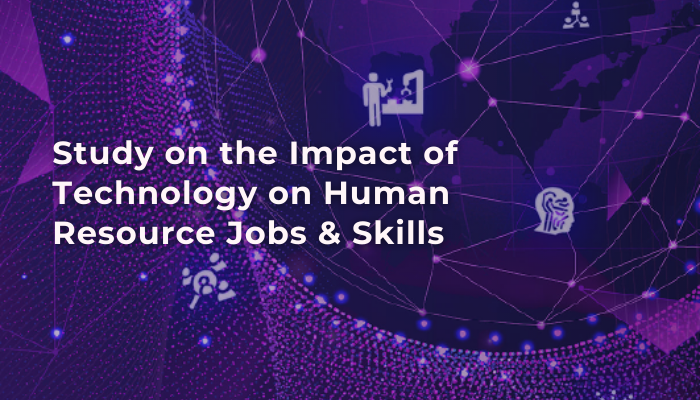
Technology will elevate the value-add of HR jobs and create new opportunities for the HR function to drive business transformation and productivity
The Institute for Human Resource Professionals and Ministry of Manpower in Singapore commissioned Willis Towers Watson, a leading global advisory, broking and solutions company, to study the impact of technology on human resources (HR) job roles and skills in three to five years’ time. The study released today reveals that 90% of HR jobs will be impacted by technology. The study on the Impact of Technology on HR jobs and skills draws upon a series of workshops and 60 interviews conducted with more than 230 business leaders and HR professionals for their views on the type of technologies impacting HR, their impact on HR functions, automation potential of HR processes, as well as new skills required.
“This study confirms a seismic shift in the HR landscape as we know it today. HR professionals need to acquire the skills to grasp technologies that will enable them to develop and implement innovative people practices for their organisations. Digital acumen will also enable HR to understand how technical skills fit into the workplace and therefore better support organisations that embark on digitalisation to unlock greater business value. HR can lead the way to evaluate the many emerging options for getting work done both within and outside HR and determine how best to combine human talent and automation,” said Mayank Parekh, CEO of Institute for Human Resource Professionals.
“As the HR functions transform, HR jobs will be redefined. New skills will be required to perform them. Our study shows that most of the 27 jobs we analysed will see significant changes to the tasks within each job, due to the availability of technology enabled solutions. And 90% of the jobs will experience a medium to high level of impact due to technology,” said Vidisha Mehta, Managing Director and Head of Talent & Rewards, Singapore, Willis Towers Watson.
The adoption of HR technology will also enable the HR function to deliver more seamless and cutting-edge employee-centric services and experiences, as well as high strategic value to businesses. The study highlighted five key themes that will transform the way HR will work in the future:
- Enhance jobs and drive transformation in organisations: The HR team in an organisation needs to enhance jobs through job redesign, lead strategic workforce planning, and be the internal change champion to drive organisation transformation.
- Equip workforce with future skills: HR leaders must identify emerging skills and skill gaps to drive re-skilling / upskilling of the workforce.
- Build consumer-grade experiences: HR leaders need to design talent journeys across the talent lifecycle and leverage technology to deliver consumer-grade experiences for employees.
- Digitalise HR: HR leaders needs to develop an integrated HR technology roadmap to drive implementation of seamless and effective delivery of HR processes.
- Drive data-based decision making: The HR function needs to drive data-based decision making across HR and business functions for more robust talent related decisions
“IHRP is preparing HR professionals to be ready to embrace these new skills and opportunities for better career development. In 2017, we launched IHRP Certification and over 3,000 have been successfully certified. To ensure that HR professionals are equipped to harness the benefits of tech transformation, IHRP has developed learning pathways on HR Technology. We have partnered with the Institute of Systems Science of the National University of Singapore to develop a Digital Competencies Roadmap for HR. Under this partnership, IHRP and NUS will develop training courses for HR professionals to acquire the skills necessary to embark on digital transformation. These courses will enable HR professionals to lead and execute business transformation projects and acquire Skills Badge in HR Technology. Finally, IHRP will inculcate a culture of continuous professional development across the IHRP community through a series of peer-led Communities of Practice (CoPs). These CoPs are led by senior HR professionals, where participants share resources and best practices. For example, the ongoing HR Tech CoP has curated 49 learning resources and organised a series of webinars and learning events attended by more than 1,000 HR professionals, to help the community better understand how technology and automation can enhance HR,” said Mayank
“For HR professionals in roles identified to be at higher risk of displacement by technology, they can be reassured that there will be upskilling opportunities available across the HR ecosystem to develop new skills and competencies such as HR Ops and Tech and Employee Experience Design. Upskilling and elevating HR professionals will create new opportunities for the HR function to drive business transformation and productivity. This will put our businesses and workforce in good stead to navigate their transformation journeys in the post-COVID world,” added Mayank
In addition to Singapore, the research also includes countries such as the US, UK and Sweden as part of the HR industry landscape scan. The scan was conducted to provide insights on the potential evolution and future technology adoption for HR in Singapore. The study identified emerging trends in HR through the analysis of over 2.5 million professional profiles, more than 180,000 job postings and 2.5 million job transitions across Singapore and the reference countries.
The report on the Study on the Impact of Technology on Human Resources Jobs & Skills is available for download here.


